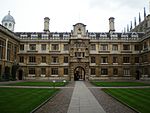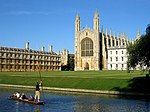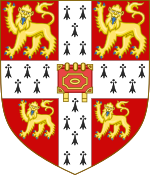Trinity Hall, Cambridge

Trinity Hall (formally The College or Hall of the Holy Trinity in the University of Cambridge) is a constituent college of the University of Cambridge.It is the fifth-oldest surviving college of the university, having been founded in 1350 by William Bateman, Bishop of Norwich, to train clergymen in canon law following decimation of their numbers during the Black Death. Historically, Trinity Hall taught law; today, it teaches the sciences, arts, and humanities. Trinity Hall has two sister colleges at the University of Oxford, All Souls and University College. Notable alumni include theoretical physicists Stephen Hawking and Nobel Prize winner David Thouless, Australian Prime Minister Stanley Bruce, Canadian Governor General David Johnston, philosophers Marshall McLuhan and Galen Strawson, Conservative cabinet minister Geoffrey Howe, Charles Howard, 1st Earl of Nottingham, writer J. B. Priestley, and Academy Award-winning actress Rachel Weisz.
Excerpt from the Wikipedia article Trinity Hall, Cambridge (License: CC BY-SA 3.0, Authors, Images).Trinity Hall, Cambridge
Trinity Lane, Cambridge Newnham
Geographical coordinates (GPS) Address Website External links Nearby Places Show on map
Geographical coordinates (GPS)
| Latitude | Longitude |
|---|---|
| N 52.2057 ° | E 0.1157 ° |
Address
Trinity Hall (University of Cambridge)
Trinity Lane
CB2 1TJ Cambridge, Newnham
England, United Kingdom
Open on Google Maps










